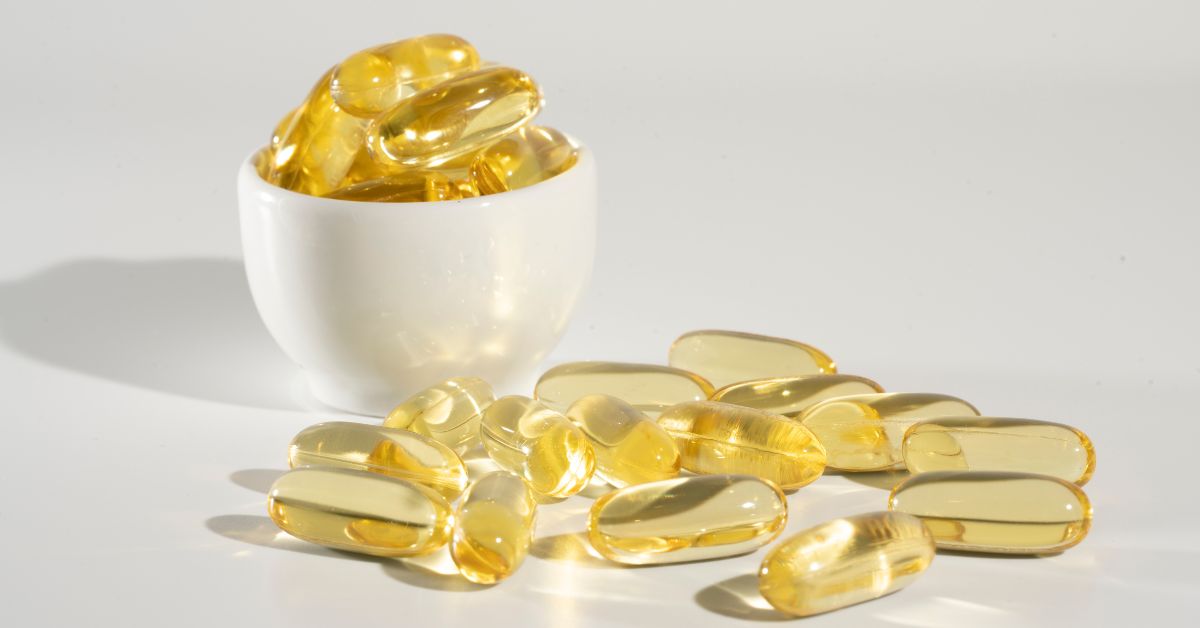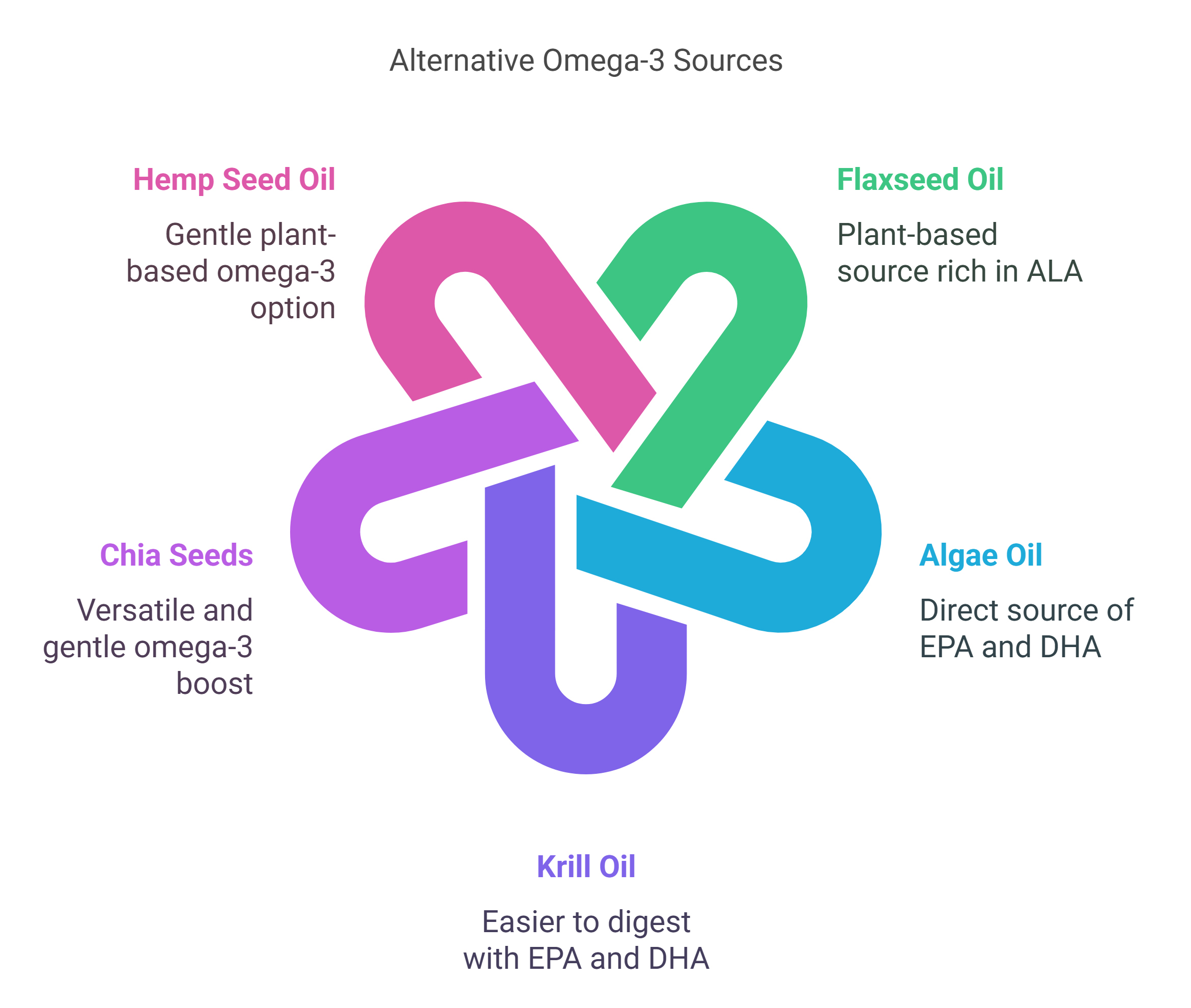You’ve just added fish oil to your daily routine, looking forward to the heart and brain benefits that omega-3s are known for. But soon, there’s an unexpected side effect—uncomfortable bloating and an unpleasant, fishy smell that lingers. For many, this surprising drawback turns fish oil from a health boost into a bit of a burden. Does fish oil give you smelly gas?
Studies show that as many as 1 in 5 people experience these digestive issues with fish oil, leading some to reconsider their supplement choice. So why does fish oil give smelly gas and discomfort?
In this article, we’ll explore what’s happening in the body to cause these side effects, simple strategies to minimize them, and an alternative—krill oil—that may offer the same health benefits with fewer digestive problems.
Why Does Fish Oil Give Smelly Gas?
Fish oil can sometimes cause smelly gas in some individuals. When you consume fish oil, your digestive system breaks down the omega-3 fatty acids, and this process can produce gases as byproducts, leading to bloating and flatulence. The “fishy” smell is due to certain compounds in fish oil that are released during digestion.
Moreover, fish oil is rich in fats, which can slow down digestion. A slower digestive process allows more time for fermentation by gut bacteria, producing gas that may have an unpleasant odor. Since everyone’s digestive system is different, some people are more sensitive to dietary fats and may experience more pronounced symptoms like gas and bloating when taking fish oil supplements.
Taking large amounts of fish oil can overwhelm your digestive system, increasing the likelihood of these side effects.
To minimize the chances of smelly gas, consider starting with a lower dose, taking fish oil with meals, or choosing enteric-coated capsules that dissolve in the intestines instead of the stomach.
Comparing Fish Oil with Other Omega-3 Sources
Fish oil is a well-known omega-3 powerhouse, but it’s no secret that it can sometimes lead to gas, bloating, or that unwelcome fishy aftertaste. If you’ve faced these side effects—you’re not alone. The good news is that there are other ways to reel in those valuable omega-3s without upsetting your stomach. Let’s dive into five alternative sources that might just be the catch you’re looking for.
- Flaxseed Oil
Flaxseed oil is like the plant kingdom’s gift to omega-3 seekers. Rich in alpha-linolenic acid (ALA), it offers a plant-based route to these essential fats. While your body needs to convert ALA into the more beneficial EPA and DHA found in fish oil, flaxseed oil is generally easier on digestion. It doesn’t carry the fishy compounds that can cause gas, making it a smoother ride for your digestive system.
- Algae Oil
Algae oil is another promising alternative, from where fish get their omega-3s. Since algae are the original producers of EPA and DHA, algae oil gives you these nutrients directly, just like fish oil. The advantage here is that algae oil typically lacks the substances in fish oil that can upset your stomach, reducing the chances of gas or bloating.
- Krill Oil
Krill oil, sourced from tiny marine creatures, also provides EPA and DHA. Many people find that krill oil is easier to digest than fish oil, possibly due to its unique molecular structure, which might enhance absorption. Plus, it’s less likely to leave you with a fishy aftertaste .
- Chia Seeds
These tiny seeds are small but mighty when it comes to omega-3 content. Chia seeds can be sprinkled onto just about anything—yogurt, salads, smoothies—and they tend to be kind to your digestive system. They offer a natural way to boost your omega-3 intake without the side effects that sometimes come with fish oil.
- Hemp Seed Oil
Hemp seed oil is another plant-based player in the omega-3 game. It’s known for being easy on the stomach, avoiding the gas and bloating that fish oil might bring. While it doesn’t pack as much omega-3 punch as fish oil, it’s a gentle option that can still support your nutritional needs.
Think of these alternatives as different paths leading to the same destination: better health through omega-3s. If one route feels rocky, another might offer a smoother journey. Everyone’s body is different, so it might be worth trying out these options to see which one your stomach prefers.
Alternative Omega-3 Supplements with Reduced Side Effects
If you’re seeking the benefits of omega-3s but find fish oil isn’t the best fit due to certain side effects, you’re not alone. Fish oil supplements can sometimes come with drawbacks beyond digestive discomfort, such as allergies, contaminants, or interactions with medications. The good news is there are alternative supplements that offer the same health perks with fewer downsides.
Why Look Beyond Fish Oil?
Fish oil can sometimes lead to:
- Allergic Reactions: If you’re allergic to fish or shellfish, fish oil supplements might trigger symptoms.
- Contaminants: Fish can accumulate heavy metals and pollutants, which may end up in the oil.
- Blood Thinning: High doses might affect blood clotting, posing risks if you’re on certain medications.
- Oxidation: Fish oil can oxidize, reducing its effectiveness and potentially forming harmful compounds.
Alternatives to Consider
Algae-Based Omega-3 Supplements
Algae oil brings you EPA and DHA—the same omega-3s in fish oil—straight from the source fish get theirs.
- Benefits: Less risk of contaminants since it’s cultivated in controlled settings. It’s also suitable for vegetarians, vegans, and those with fish allergies.
- Fewer Side Effects: Generally well-tolerated without the risk of allergic reactions linked to fish products.
Krill Oil Supplements
Sourced from tiny ocean creatures, krill oil offers omega-3s bound to phospholipids, which may enhance absorption.
- Benefits: Contains astaxanthin, a natural antioxidant that helps protect the oil from oxidation.
- Considerations: Typically harvested from cleaner waters, reducing contaminant exposure. Not suitable if you have shellfish allergies.
Calamari (Squid) Oil Supplements
Calamari oil is rich in DHA and is derived from a more sustainable marine source.
- Benefits: Lower on the food chain, so there’s less accumulation of toxins. Higher DHA content supports brain health.
- Fewer Side Effects: Less risk of contaminants and oxidation compared to some fish oils.
Ahiflower Oil Supplements
Ahiflower oil is a plant-based supplement rich in stearidonic acid (SDA), which your body efficiently converts to EPA.
- Benefits: Provides a more effective conversion to EPA than flaxseed oil. Safe for those with fish allergies.
- Fewer Side Effects: Being plant-based, it avoids the allergen and contaminant issues associated with marine oils.
EPA and DHA from Genetically Enhanced Plants
Advances have allowed for the production of EPA and DHA from specially cultivated plants like canola.
- Benefits: Offers the exact omega-3s found in fish oil without animal involvement.
- Fewer Side Effects: Controlled growing conditions reduce contamination risks. Suitable for vegetarians and vegans.
Making the Switch
Choosing an alternative omega-3 supplement can help you avoid side effects linked to fish oil:
- Reduced Allergy Risk: Plant-based and certain marine oils are less likely to cause allergic reactions.
- Cleaner Sources: Controlled cultivation and lower food chain sourcing mean fewer contaminants.
- Better Stability: Some alternatives are less prone to oxidation, maintaining their efficacy longer.
Finding What’s Right for You
Everyone’s health needs are unique. Consider:
- Dietary Preferences: Vegetarian or vegan options are available.
- Allergy Concerns: Avoid marine-based supplements if you have relevant allergies.
- Health Goals: Some supplements offer higher DHA for brain health or come with added antioxidants.
Practical Tips to Reduce Smelly Gas from Fish Oil
Experiencing smelly gas from fish oil can be an unpleasant side effect. Here are some simple, effective ways to minimize discomfort while still enjoying the benefits of omega-3s:
Take Fish Oil with Meals
Consuming fish oil with food, especially a balanced meal, can help slow digestion and reduce the chance of gas and bloating. Avoid taking it on an empty stomach, which can sometimes increase these side effects.
Try Enteric-Coated Fish Oil Capsules
Look for enteric-coated capsules, which are designed to dissolve in the intestines rather than the stomach. This coating can help prevent fishy burps and gas by delaying release until further along in the digestive process.
Start with a Lower Dose
If you’re new to fish oil, begin with a lower dose and gradually increase it over a few weeks. This allows your digestive system to adjust and may reduce the chance of gas and bloating.
Choose High-Quality Fish Oil
Lower-quality fish oils may contain impurities or oxidized fats that can contribute to digestive issues. Opt for a high-quality, purified fish oil to minimize unwanted side effects.
Consider Switching to Krill Oil
Krill oil offers the same omega-3 benefits but is often gentler on the digestive system due to its unique structure. It’s a good alternative if fish oil consistently causes discomfort.
Store Capsules in the Freezer
Freezing fish oil capsules can reduce the fishy aftertaste and help prevent gas. The frozen capsules dissolve more slowly, which can reduce digestive issues for some people.
These tips can help make fish oil a more comfortable part of your routine, so you can enjoy its health benefits without the unwanted side effects.
Conclusion
If you’re looking for the benefits of omega-3s without the hassle of digestive side effects, krill oil may be the perfect fit. Its unique composition allows for smoother digestion and faster absorption, making it a gentler option for those sensitive to fish oil. Plus, the natural antioxidant astaxanthin in krill oil adds extra benefits that support your overall health.
Choosing the right omega-3 supplement doesn’t have to be complicated. With krill oil, you can enjoy all the heart, brain, and joint health advantages of omega-3s without worrying about bloating, gas, or fishy aftertaste. Whether you’re switching to krill oil for the first time or looking for a better fit for your digestive system, krill oil offers a simple, effective way to support your wellness.
FAQs
Does Krill Oil Cause Smelly Gas?
Krill oil is generally less likely to cause smelly gas compared to fish oil, thanks to its phospholipid structure, which makes it easier to absorb and gentler on digestion. However, as with any supplement, individual responses can vary, and some people may still experience mild digestive effects.
How Long Does Fish Oil Cause Gas?
When fish oil causes gas, symptoms usually appear within a few hours of taking the supplement and may last a few hours as the body digests it. Many find that their body adapts over time, and symptoms lessen with consistent use. Starting with a small dose and gradually increasing it can also help reduce both the duration and intensity of gas.
Are There Other Digestive Side Effects of Fish Oil?
In addition to gas, fish oil can sometimes cause bloating, mild stomach cramps, or a fishy aftertaste, especially in larger doses. “Fish burps,” a common experience where users notice a fishy flavor in burps, can also occur. Krill oil, due to its composition, is often less likely to cause these issues, as it is absorbed more efficiently and tends to have a milder aftertaste.
Is Krill Oil a Good Substitute for Fish Oil?
Krill oil can be an excellent substitute for fish oil, particularly for those sensitive to fish oil’s side effects. Its phospholipid structure allows for faster absorption, reducing the risk of gas, bloating, and aftertaste. Krill oil also provides omega-3s along with the antioxidant astaxanthin, which adds extra health benefits and stability.













